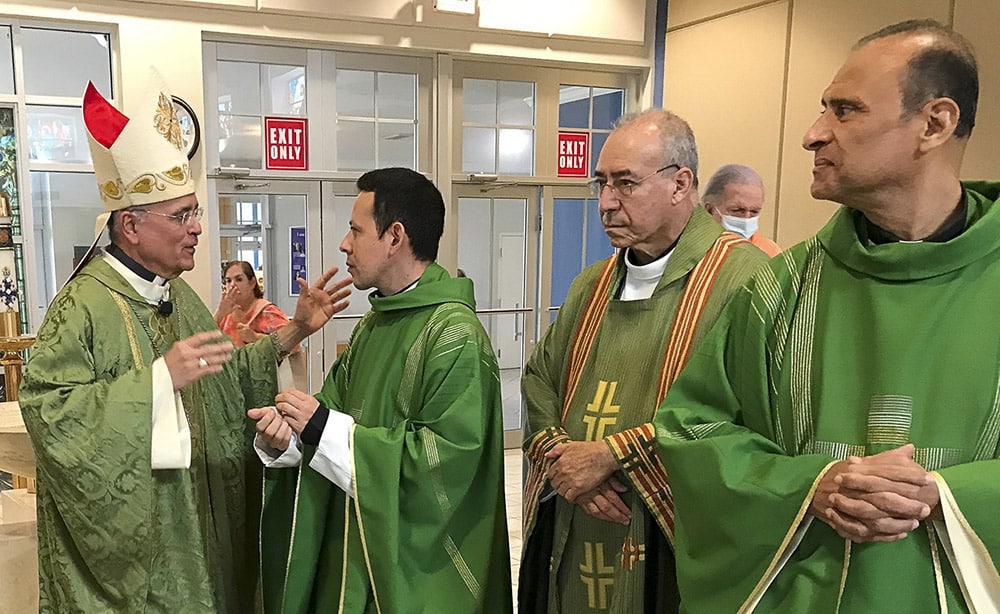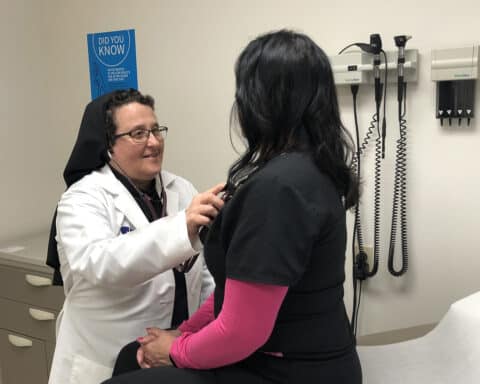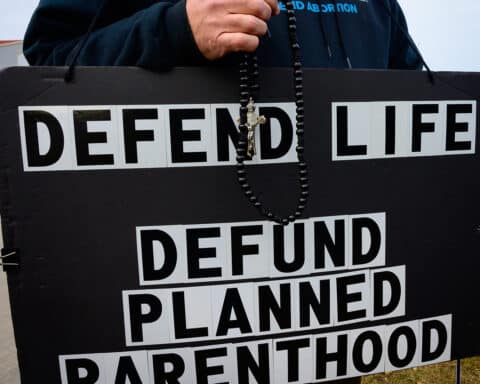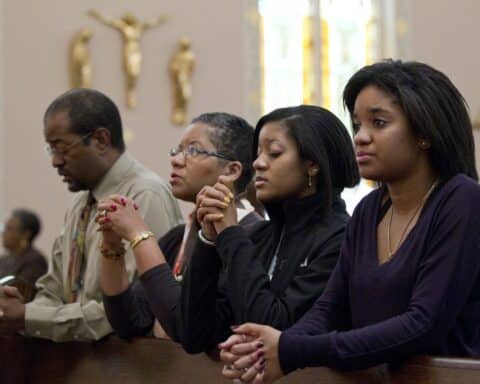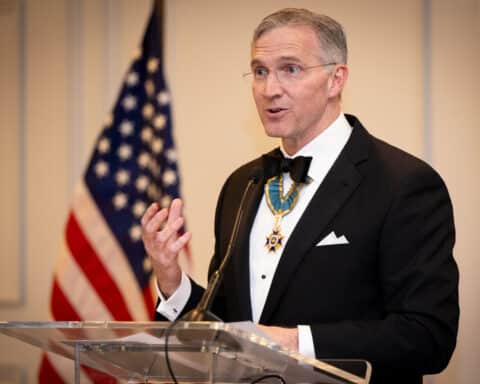MIAMI (OSV News) — Two Nicaraguan priests, part of the group of more than 200 political prisoners released Feb. 9 by the regime of Daniel Ortega, arrived from Washington to Miami and celebrated Mass with their compatriots in exile.
Father Benito Enrique Martínez, from the Diocese of León, and Father José Luis Díaz, from the Diocese of Matagalpa, concelebrated a Feb. 12 Mass with Bishop Silvio Báez, auxiliary bishop of Managua, in thanksgiving for the release of political prisoners at St. Agatha Church in Sweetwater, west of Miami.
At the beginning of the Mass, Father Marcos Somarriba, pastor of St. Agatha Parish, introduced the priests and said he was happy that they had asked to come to St. Agatha, where one of the largest Nicaraguan communities in the U.S. congregates.
Both priests spoke to La Voz Católica, the Spanish-language newspaper of the Archdiocese of Miami, after the Mass about their confinement in El Chipote, a maximum-security prison located in Managua, the capital of Nicaragua.
Father Martínez, who served for years at Santa Marta Parish in Managua, and also was chaplain at La Salle school, was violently detained by police Oct. 13, 2022, while he was in the rectory.
In 2018, Father Martínez strongly supported young people in their civic protest to achieve change in Nicaragua. “We thank you, Father, and we are glad that you are free,” Bishop Báez said during Mass.
He spent four months in prison for “telling the truth,” Father Martínez said. But, he continued, the regime began to “invent that (I) was endangering the stability of the country and making comments contrary to the government.”
The priest stressed this accusation was a pretext because what the regime wanted to punish him for was for what he said May 30, 2022, during a public demonstration in the streets of Managua, publicly condemning the murders committed by the regime. He added that he saw a boy fall dead — “shot in the forehead” — three meters away from him.
That cannot be denied, Father Martínez said, because “we all saw it,” but the police have not arrested anyone, and no one is in jail, “not even one of the murderers.”
Since massive demonstrations by the Nicaraguan population began in 2018, in different parts of the country, against the regime of Daniel Ortega and his wife, Rosario Murillo, more than 300 people have died, according to data from the Inter-American Commission on Human Rights.
During his stay in jail, Father Martínez said they were taken out of their cell at any time of the day for interrogations — early morning, midnight, noon, in the afternoon. “You were tied with your hands cuffed and any officer with a rank would interview you, sometimes to say nonsense and insults,” he said.
On one occasion, Father Martínez recounted, officers told him that they had never touched a single hair of his there. But the reality is that “physically they may not have, although my arms were completely raw from the handcuffs.”
The torture was psychological, which is often worse, because it has a deeper impact. “They make you undress in public. That they make you defecate in public, that is worse than physical torture,” said the priest.
Now, far from the torture of El Chipote and Nicaragua, Father Martínez said that, deep down, he feels sadness, even though he is free, because his family is still in his country, and they are in danger.
“Yes, I am in the United States — this is a free country, a great country — but your heart stays there, praying for our family, placing it in the hands of the Lord and hoping that soon this will change, and we can all return to Nicaragua and be one family, as we should have always been,” he said.
With his release and that of the other political prisoners, Father Martínez believes that there will soon be a change for the better in Nicaragua.
Father Díaz, the other freed priest who came to Miami, is the vicar of the Cathedral of Matagalpa, rector of the Shrine of the Divine Child and head of the communication media of the Diocese of Matagalpa, which included Radio Hermanos and TV Merced before being closed by the Ortega regime.
During the Mass at St. Agatha, Bishop Báez said that Father Díaz was a right hand of Bishop Rolando Álvarez of Matagalpa. “We all want to play the role of your bishop, too, offering you our love and our support. We thank God for your freedom,” he told the priest.
Father Díaz said he was arrested along with Bishop Álvarez Aug. 4, 2022.
They were in the building for the curia and could no longer leave because the police surrounding the building prevented them. That is, “until Aug. 19 at three in the morning, when they took us out by force, almost dragging us. They entered breaking doors, windows. It was absolutely something that affected us a lot at the time,” the priest said.
Why did they arrest him? “That is a question every Nicaraguan asks,” Father Díaz said. “I was doing absolutely nothing, but for simply supporting our bishop, we had to spend almost six months in El Chipote.”
Father Díaz added that Bishop Álvarez was under house arrest at first, which also is very hard.
Bishop Álvarez was sentenced to 26 years in prison for refusing to leave the country along with the 222 political prisoners who left Nicaragua on a Feb. 9 flight to Washington, deported from their own country. According to Feb. 15 reports, Bishop Álvarez is believed to be isolated in a punishment cell at “La Modelo” prison.
Part of the Ortega regime’s repression against the Nicaraguan people was the closure of the independent media and Catholic media in August last year.
“In a single day, they shut down all the radio stations, not only the diocesan one, which is Radio Hermano — a radio station that has been around for many years — but also the other parochial radio stations,” Father Díaz said.
“They entered forcing doors open, threatening the staff to turn it off immediately, even taking part of the equipment,” said the priest, adding that they do not have a radio station as such with an AM/FM antenna, but continue to work through their website and social networks.
The closure of the stations took place about a week before the priests were arrested.
During the time he was in jail, Father Díaz said he hoped “that we were going to get out at some point, and that they were going to take us directly to our homes, to our families. But the surprise was when we entered the airport, and they forced us to sign a paper that we were voluntarily deciding to travel to the United States. So, we signed but realized with sadness that my bishop had not gone up (the plane).”
Bishop Álvarez “said that he did not leave Nicaragua because his people are his homeland,” Father Díaz said. “He is a bishop close to the people; the people of Nicaragua love him, pray for him.”
During Father Díaz’s confinement, regime agents wanted him to declare otherwise, but he remained firm.
“Even though the officials wanted me to deny God, accuse Bishop Rolando or do barbaric things, thanks to God, the Virgin and the Holy Spirit, I never lacked strength,” he said.
Father Díaz said that he did not know that Nicaragua had so many political prisoners until he boarded the plane that would bring him to Washington. Among the 222 political prisoners released by the Ortega regime are political leaders, Sandinista leaders, students, five priests, a deacon, two seminarians and three laypeople committed to the Nicaraguan church.
“We were surprised, but it made us happy. As Bishop Silvio said in his homily, the Lord is always with his people,” he indicated. “This is a sign of liberation, of that path that leads us to the promised land. Nicaragua’s freedom will soon come.”
Rocío Granados writes for La Voz Católica, the Spanish-language newspaper of the Archdiocese of Miami, part of Florida Catholic Media.

